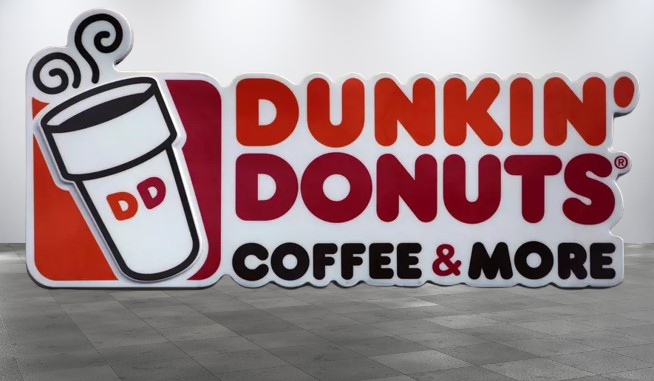MAGA Influencers Call for Dunkin’ Donuts Boycott—Is America’s Favorite Coffee Chain Going the Way of Bud Light?
Introduction: Stirring the Pot (of Coffee)
In the latest twist of the ongoing culture wars, Dunkin’ Donuts has found itself in hot water with prominent MAGA influencers. What started as a routine corporate decision has rapidly snowballed into calls for a nationwide boycott, echoing the recent backlash faced by Bud Light. But what exactly sparked this controversy, and could it really impact America’s favorite coffee chain? Let’s dive into the details with a mix of humor, analysis, and a dash of optimism.
The Brewing Storm: Rumble, Right-Wing Content, and Dunkin’s Dilemma
The drama began when Rumble’s CEO, Chris Pavlovski, shared an email snippet from Dunkin’s parent company, Inspire Brands, on social media platform X (formerly known as Twitter). The email suggested that Dunkin’ Donuts was hesitant to advertise on Rumble due to the platform’s “right-wing culture,” which the brand found “too polarizing” from a sustainability standpoint.
In response, Pavlovski didn’t just keep the email to himself—he took to social media, effectively pouring gasoline on the fire. The post quickly caught the attention of MAGA influencers, who rallied their followers to boycott Dunkin’ Donuts, arguing that the coffee giant had caved to “woke” pressures. The hashtag #BoycottDunkinDonuts soon started trending, and suddenly, a quiet decision about ad placement became the latest battleground in the culture wars.
Table: Key Events Leading to the Dunkin’ Donuts Boycott
| Date | Event |
|---|---|
| August 2024 | Rumble CEO Chris Pavlovski shares email from Dunkin’ Donuts on X, sparking outrage. |
| August 2024 | MAGA influencers call for a boycott of Dunkin’ Donuts. |
| August 2024 | Hashtag #BoycottDunkinDonuts trends on social media. |
Why Dunkin’ Donuts? The Context Behind the Boycott
You might be wondering, why Dunkin’ Donuts? Why has America’s beloved purveyor of coffee and donuts suddenly become a target? The answer lies in a broader trend of corporate America navigating the treacherous waters of political and cultural polarization. Brands are increasingly finding themselves forced to pick sides, whether they want to or not. And in the current climate, staying neutral is becoming increasingly difficult.
Dunkin’ Donuts, like many other brands, has to consider the potential backlash from both sides of the political spectrum. On one hand, they risk alienating their customer base by appearing to support divisive content; on the other, they face boycotts for refusing to advertise on platforms favored by right-wing audiences. It’s a classic “damned if you do, damned if you don’t” scenario.
The MAGA Reaction: Calls for a Dunkin’ Donuts Boycott
Once the email was made public, influential right-wing voices, such as the anonymous social media figure “Catturd,” took up the cause, comparing Dunkin’s actions to Bud Light’s controversial campaign with transgender influencer Dylan Mulvaney. “Catturd” and other MAGA influencers, including Steven Crowder, urged their followers to give Dunkin’ Donuts “the Bud Light treatment,” calling for a full-scale boycott of the brand.
For those unfamiliar, Bud Light faced a severe backlash in 2023 after launching a campaign featuring Dylan Mulvaney, which led to a significant dip in sales and a damaged reputation among conservative consumers. The fear among Dunkin’s executives is likely that a similar boycott could hurt their bottom line—though whether it will have a lasting impact remains to be seen.
List: Potential Outcomes of the Dunkin’ Donuts Boycott
- Short-term Sales Impact: Like Bud Light, Dunkin’ Donuts could experience an initial dip in sales as a result of the boycott, particularly in regions with strong MAGA support.
- Brand Reputation: Dunkin’s decision to avoid advertising on Rumble might be seen as taking a stand against divisive content, which could appeal to more moderate or left-leaning consumers. However, it risks alienating a significant portion of its customer base.
- Long-term Consequences: Depending on how the situation unfolds, Dunkin’ Donuts could either emerge as a brand that successfully navigated the culture wars or one that misjudged its audience.
Insights from the Coffee Counter: A Barista’s Take on the Controversy
Having worked at a Dunkin’ Donuts during the peak of the Bud Light controversy, I can tell you firsthand that these boycotts can create a unique kind of tension. On one hand, you have regular customers who might not care about the politics behind their morning coffee. On the other, there’s an undeniable shift in atmosphere when a boycott like this gains traction. People start talking—whether it’s to vent their frustrations or to express their support.
Interestingly, many customers I interacted with during the Bud Light boycott weren’t entirely committed to the cause—they were more interested in how the controversy would affect their favorite brands. So, while the loudest voices might dominate the conversation online, the reality at the counter is often much more nuanced.
Conclusion: What’s Next for Dunkin’ Donuts?
As the calls to boycott Dunkin’ Donuts continue to grow, it’s hard to predict exactly how this will play out. Will Dunkin’ follow in Bud Light’s footsteps, suffering a significant hit to its sales and brand image? Or will this blow over as just another blip in the ever-escalating culture wars?
What’s clear is that in today’s polarized climate, brands like Dunkin’ Donuts are walking a tightrope. The decisions they make about where and how to advertise can have far-reaching consequences, not just for their bottom line but for their reputation as well.
For now, Dunkin’ Donuts is holding steady, neither confirming nor denying the claims made by Rumble’s CEO. But as we’ve seen time and again, the court of public opinion can be swift and unforgiving. Whether you’re sipping your coffee in solidarity or looking for a new go-to brew, one thing’s for sure: the conversation around Dunkin’ Donuts isn’t cooling down anytime soon.
So, grab your favorite Dunkin’ drink (or don’t) and stay tuned—this story is far from over.

